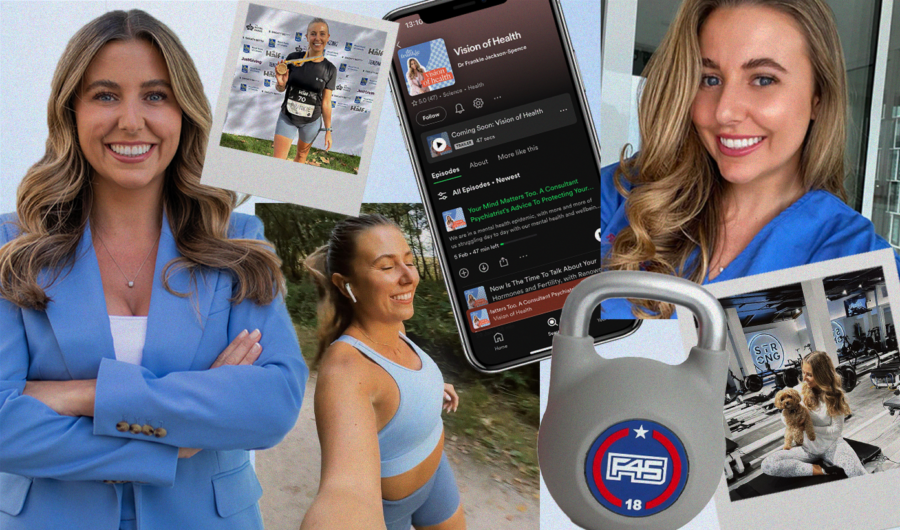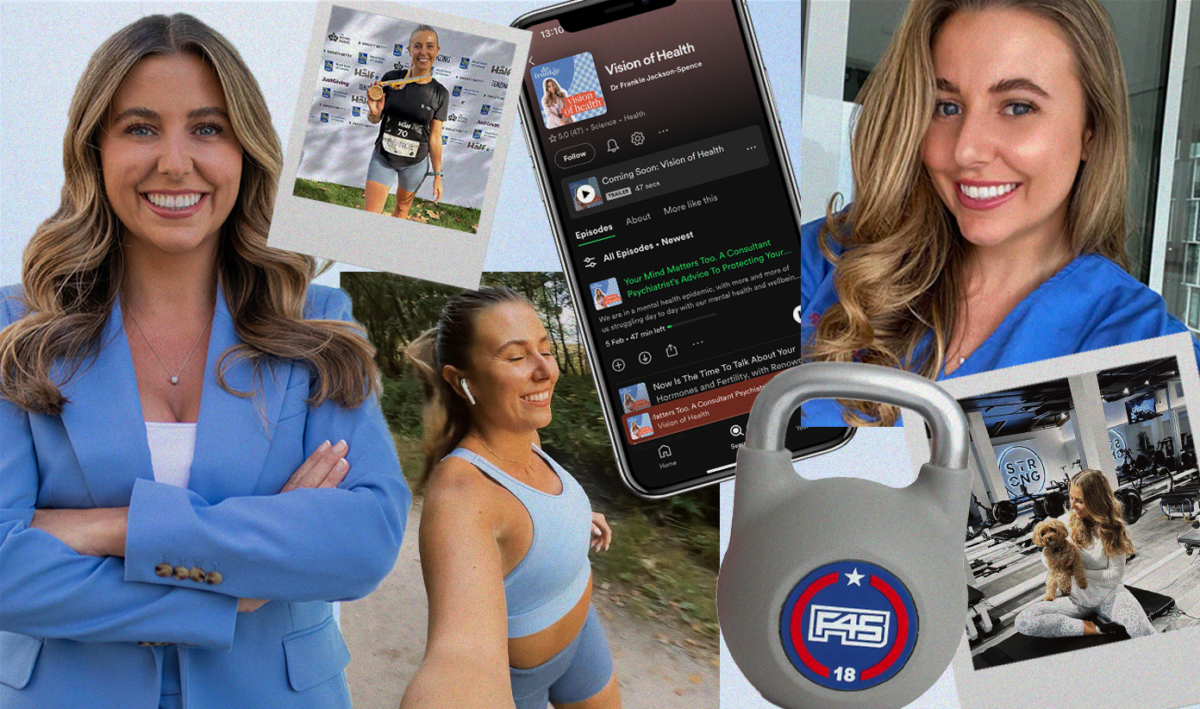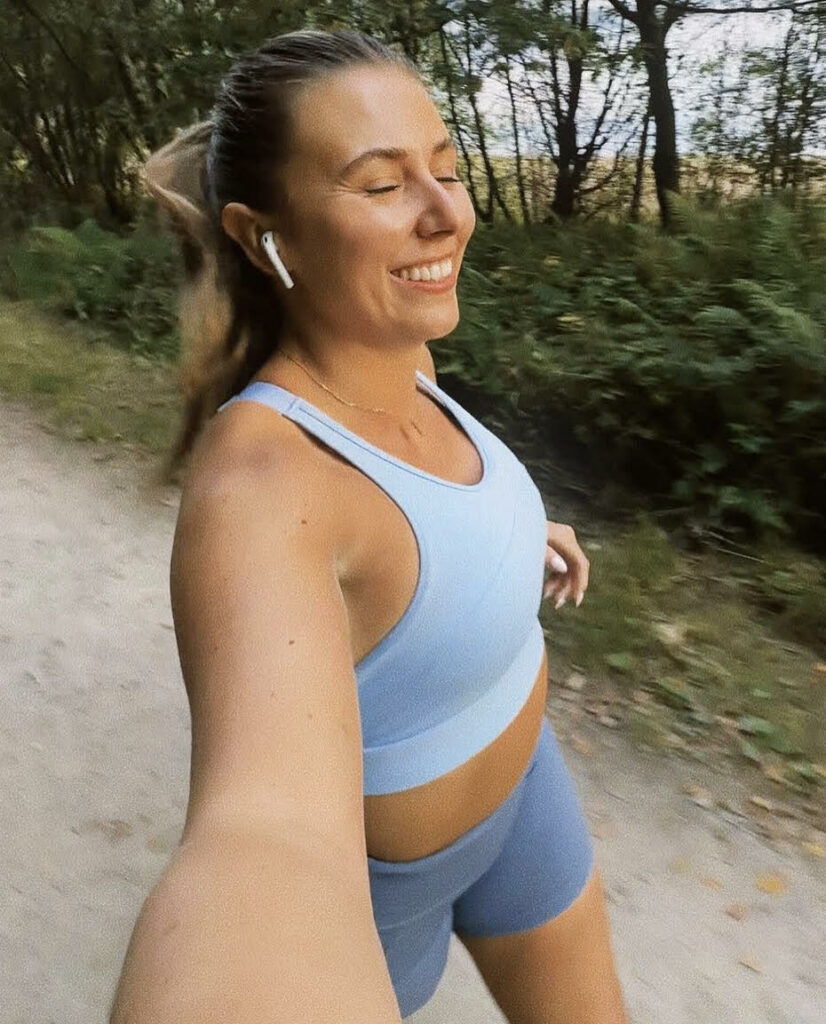Introducing ‘Why I Move,’ a fresh series dedicated to chatting with individuals within the health and wellness space. We’ll delve into their motivations for exercise, explore the origins of their passion for fitness, discuss how they integrate exercise into their lifestyles, and, above all, discover the driving force behind their movement!
Debuting our new series, we had the pleasure of sitting down with Dr Frankie Jackson-Spence, a medical doctor who also happens to be a personal trainer. Dr Frankie is not only a familiar face on television as a medic but also hosts the popular podcast Vision of Health. Between her commitments as an NHS doctor, maintaining her social media presence, and gracing the screens as a media personality, Dr Frankie kicks off our series by discussing her connection with movement, how she navigates exercise amidst her busy career, and her preferred ways to stay active.
Why do you move?
Like many people, I originally got into exercising to get my body into better shape. But quickly the motivation for that wears off and I continued exercising because of the mental benefits. I found at medical school, that if I felt stressed or overwhelmed, taking myself out on a run and getting some fresh air, or going to the gym helped me switch off from my busy to-do list for an hour or so, and became a form of mindfulness! This has continued into my working life, and I find taking an hour to myself each day gives me some ‘me time’ before a busy day giving my energy to others and to my patients.
What are some of your earliest recollections of physical activity as a child?
I have always been active and used to do every club at school. My earliest memories are playing tennis with my brother using a makeshift tennis net in the back garden! I still regularly play tennis now!
What type of movement do you regularly incorporate into your routine?
I like functional training so I do a variety. It’s important to remember any form of exercise and movement will benefit your health. I regularly go out running and usually am always training for an event such as a half marathon. I do F45 a few times a week which I love as it is the perfect hybrid of resistance and cardiovascular training. I also play tennis at least once a week. I think we really neglect sports! I love making my workouts social so you’ll also catch me doing Reformer pilates classes with friends.
How do you prioritise your fitness around your demanding career as an NHS doctor?
I get up early and fit my training in before work. I find leaving it to the evening is difficult as if I’m in clinic, I can finish at erratic times. I prefer having a few hours in the morning to wake up and invest some time into myself before the day starts.
What motivates you to exercise?
I do it for that post-workout fuzzy feeling! It really energises me and sets me up for the day. I tend to do a longer run on a weekend and I will usually do this with a friend, knowing there is a proper coffee and a crispy almond croissant waiting for me at the end!
If you’re feeling a bit low or your energy isn’t there, do you push through a workout or do you consider prioritising rest instead?
It depends, sometimes when it’s dark, cold and miserable outside, it can be difficult to get up to work out. In these moments, you can’t rely on motivation, but instead on habit and routine. I’m pretty good at being honest with myself and knowing if it’s a motivation issue, or if I genuinely need to recover. Recovery is just as important as our training and sometimes it is important to prioritise rest and get a few extra hours sleep! On these days, I will still move my body by making sure I get out on a walk at lunchtime or after work, as my job can be quite sedentary.
What is your favourite exercise class?
My favourite for the last 5 years is F45 Stratford – the energy in the studio is unmatched and because of this, I never feel like I’ve had a bad workout and I’ve never gotten bored. I also enjoy Reformer pilates and my favourites are Psycle, Oxford Circus and Strong, Islington. I also really rate the running app Runna, which I use to program my running.
What are the workout essentials that help you stay on track?
I think it’s more about having a membership and community. I see the same faces in my F45 classes each morning, and they have now become friends. Knowing they will be there motivates me! I also love tracking my runs on my Garmin Venu 3 and I’ve recently become really interested in tracking my sleep and recovery stats on the device.
What is your go-to meal post-workout?
As women it’s really important we fuel our workouts properly, to ensure we don’t inappropriately spike our stress hormones. My favourite post-workout treat is an almond croissant, but I save that for the weekend. Mid week I will make overnight oats or porridge, with chunky rolled organic oats for carbohydrate repletion, some thick creamy green yoghurt for extra protein, almond butter to slow digestion and blueberries and a seed mix sprinkle to feed my gut microbiome!
When you’re stuck in a fitness rut, what’s your top piece of advice for getting back on track?
Make it easy! If you’re completely out of the routine, completely overhauling your life to get back into training regularly can be difficult. Instead, try and rebuild the routine up by making it easy. For example, if I go to an F45 class, I have to factor in travel there and back, and packing my bag to get ready for work. Whereas running is easier as I can start and finish at my doorstep, so the process takes less planning. Starting with the easier option here is a good way to get back into it and re-form a consistent routine. Committing to working out with a friend can also help as it keeps you accountable.
As a doctor and a PT, what way do you see exercise impacting people’s mental health?
Exercise is hugely beneficial for our mental health and well-being, and I recommend staying active to all my patients. Exercise causes the release of neurotransmitters in our brain like dopamine, noradrenaline, and serotonin, which improves food and reduces feelings of anxiety. Long-term, regular exercise has been shown to be both protective against mental health conditions and also is a really effective treatment for established conditions. I think there are so many benefits to exercise that we can’t necessarily see – whether that be improved mental well-being, improved physiological parameters such as glucose levels or cholesterol, reduced risk of many diseases, and so from a health perspective, a ‘bad workout’ quite literally doesn’t exist!


















